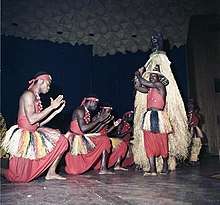Les Ballets Africains
Les Ballets Africains is the national dance company of Guinea[1] and is based in Conakry. It is one of the first African national dance companies.[2] It has toured extensively around the world.[2] Although the name might suggest the idea of European ballet to English speakers, because the name is in French, the focus of the company is actually on promoting traditional African dance and culture.[3]

History
The roots of the Les Ballets Africains go back to Guinean poetry student, dancer, choreographer and musician Fodéba Keïta.[4][5] In France in 1948, he founded a poetry group for Africans, which gradually evolved into the drumming, dancing and storytelling African Theater Ballet of Fodeba Keita.[4]
It toured Europe from 1951 to 1955 and the United States in 1953.[4] It became Les Ballets Africains in 1952 in Paris.[5][6] There was strong opposition at first; various tribes were offended that others were dancing their dances and singing their songs, but gradually that objection was overcome.[6] In the 1950s, among the notable musicians recruited were djembe drummers "Papa" Ladji Camara of Mali[4] and Guinean Famoudou Konaté.[7] The group performed in the United States in 1959, with a run of 48 performances on Broadway,[8] following a successful European tour. After Guinea obtained its independence from France in 1958, then President of Guinea Ahmed Sékou Touré made the ballet the national ensemble.[9] When President Sékou Touré died in 1984, government support came to an end, and the troupe encountered financial difficulties for several years, but has subsequently resumed touring.[10]
In 1991, Italo Zambo, the company's artistic director, noted that the Los Angeles day performances differed from the night ones and performances in Africa and Europe in one respect: traditionally, Guinean men and women dance bare-chested.[6] In 1967, while touring in Quebec, Canada, the troupe's director had to go to court in Montreal to answer the charge of inciting minors to give an indecent performance for this very reason.[11][12] The judge dismissed the charge.
Notable past members
- Famoudou Konaté
- Kemoko Sano
- Moustapha Bangoura
- Mouminatou Camara
- Aly Diabate
- Abou Sylla (N'Camara Abou Sylla)
- Arafan Toure
References
- Kaderlan, Alice (12 April 2004). "It's hard not to be swept away by Les Ballets Africains". Seattle PI. Retrieved 6 November 2008.
- Onwudiwe, Ebere; Ibelema, Minabere (2003). Afro-optimism: Perspectives on Africa's Advances. Greenwood Publishing Group. p. 54. ISBN 9780275975869. Retrieved 25 October 2016.
- "Les Ballets Africains: African Culture for the Modern World". Les Ballet Africains. Retrieved 19 July 2009.
- Juang, Richard M. (2008). Africa and the Americas: Culture, Politics, and History. ABC-CLIO. pp. 535–540. ISBN 9781851094417. Retrieved 25 October 2016.
- Cohen, Joshua (2011). "Stages in Transition: Les Ballets Africains and Independence, 1959 to 1960". Journal of Black Studies. 43: 11. doi:10.1177/0021934711426628. JSTOR 23215194.
- Chris Pasles (15 March 1996). "Les Ballets Africains Unveils Cultural 'Heritage'". Los Angeles Times.
- "Famoudou Konaté". djembe.com. Archived from the original on 2016-10-26. Retrieved 2016-10-26.
- "Les Ballets Africains". Internet Broadway Database. Retrieved 22 January 2012.
- "Les Ballets Africains making a return to Utah". Deseret News. Retrieved 6 November 2008.
- David Nicholson (20 September 1991). "Les Ballets Africains: Sensual Dancing, Exuberant Chanting". Daily Press.
- Jacques Bertrand (8 January 2012). "Les Ballets africains censurés". Radio Canada.
- Julye Huggins (March 2010). "Censorship in Montréal: Les Ballets Africains". the Dance Current.